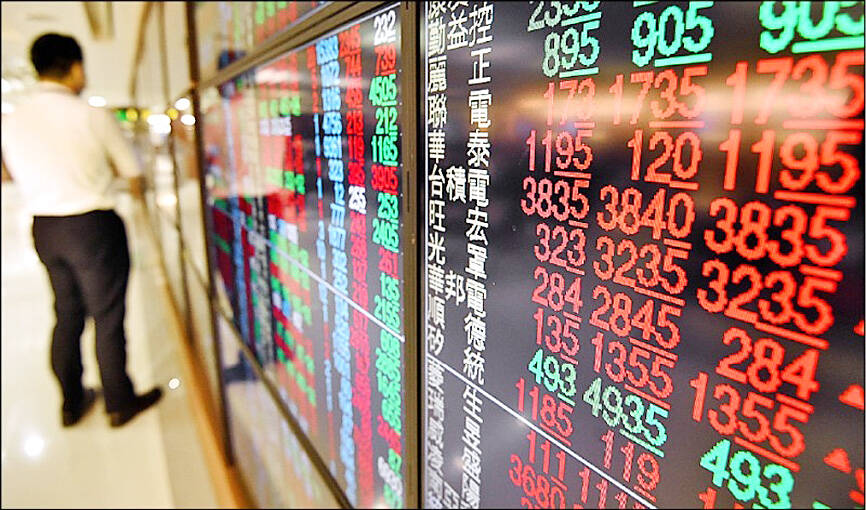Tax revenue last month rose 11.3 percent from a year earlier to NT$239.1 billion (US$7.4 billion), lifted mainly by gains in corporate and personal income taxes, as well as stock exchange transactions, the Ministry of Finance said yesterday.
Personal income tax revenue swelled 37.5 percent to NT$40.7 billion, as some firms distributed year-end bonuses last month, ministry statistics official Liu Shun-rong (劉訓蓉) said, adding that cash dividends and capital gains from property deals contributed to the increase.
There is a trend for firms and mutual funds to distribute cash dividends every quarter rather than annually, the ministry said.

Photo: Wu Chi-lun, Taipei Times
Corporate income tax revenue rose 5.7 percent to NT$9 billion as firms gradually emerged from an economic slowdown induced by inventory adjustments, sharp global inflation and monetary tightening, it said.
The improving macroenvironment lent support to the local bourse, which has seen capital inflows from mutual funds and foreign players seeking to take advantage of the artificial intelligence (AI) boom, Liu said.
Taiwan is home to the world’s largest contract manufacturers of high-performance computing chips, high-capacity servers, storage, memory chips and other electronics.
Tax revenue from securities transactions in March spiked 65.6 percent to NT$29.1 billion, with average daily turnover soaring 88.4 percent from a year earlier to NT$551.7 billion, the ministry said, citing Taiwan Stock Exchange data.
The TAIEX climbed above the 20,000 points this month as dozens of local tech firms participate in supply of global AI infrastructure and services.
A positive wealth effect helped boost tax revenue from land value gains, which rose 13.8 percent to NT$7.8 billion, Liu said.
However, tax revenue from tariffs and sales of goods shrank 3.4 percent and 12.7 percent to NT$142 billion and NT$13 billion respectively, owing partly to a decline in vehicle imports, she said, adding that delayed recognition of vehicle sales contributed to the lackluster figures.
In the first quarter, the ministry collected NT$557.6 billion of tax revenue, a 14.5 percent increase from a year earlier and ahead of the government’s budget schedule by 16.4 percent, she added.

To many, Tatu City on the outskirts of Nairobi looks like a success. The first city entirely built by a private company to be operational in east Africa, with about 25,000 people living and working there, it accounts for about two-thirds of all foreign investment in Kenya. Its low-tax status has attracted more than 100 businesses including Heineken, coffee brand Dormans, and the biggest call-center and cold-chain transport firms in the region. However, to some local politicians, Tatu City has looked more like a target for extortion. A parade of governors have demanded land worth millions of dollars in exchange

An Indonesian animated movie is smashing regional box office records and could be set for wider success as it prepares to open beyond the Southeast Asian archipelago’s silver screens. Jumbo — a film based on the adventures of main character, Don, a large orphaned Indonesian boy facing bullying at school — last month became the highest-grossing Southeast Asian animated film, raking in more than US$8 million. Released at the end of March to coincide with the Eid holidays after the Islamic fasting month of Ramadan, the movie has hit 8 million ticket sales, the third-highest in Indonesian cinema history, Film

Taiwan Semiconductor Manufacturing Co’s (TSMC, 台積電) revenue jumped 48 percent last month, underscoring how electronics firms scrambled to acquire essential components before global tariffs took effect. The main chipmaker for Apple Inc and Nvidia Corp reported monthly sales of NT$349.6 billion (US$11.6 billion). That compares with the average analysts’ estimate for a 38 percent rise in second-quarter revenue. US President Donald Trump’s trade war is prompting economists to retool GDP forecasts worldwide, casting doubt over the outlook for everything from iPhone demand to computing and datacenter construction. However, TSMC — a barometer for global tech spending given its central role in the

Alchip Technologies Ltd (世芯), an application-specific integrated circuit (ASIC) designer specializing in server chips, expects revenue to decline this year due to sagging demand for 5-nanometer artificial intelligence (AI) chips from a North America-based major customer, a company executive said yesterday. That would be the first contraction in revenue for Alchip as it has been enjoying strong revenue growth over the past few years, benefiting from cloud-service providers’ moves to reduce dependence on Nvidia Corp’s expensive AI chips by building their own AI accelerator by outsourcing chip design. The 5-nanometer chip was supposed to be a new growth engine as the lifecycle